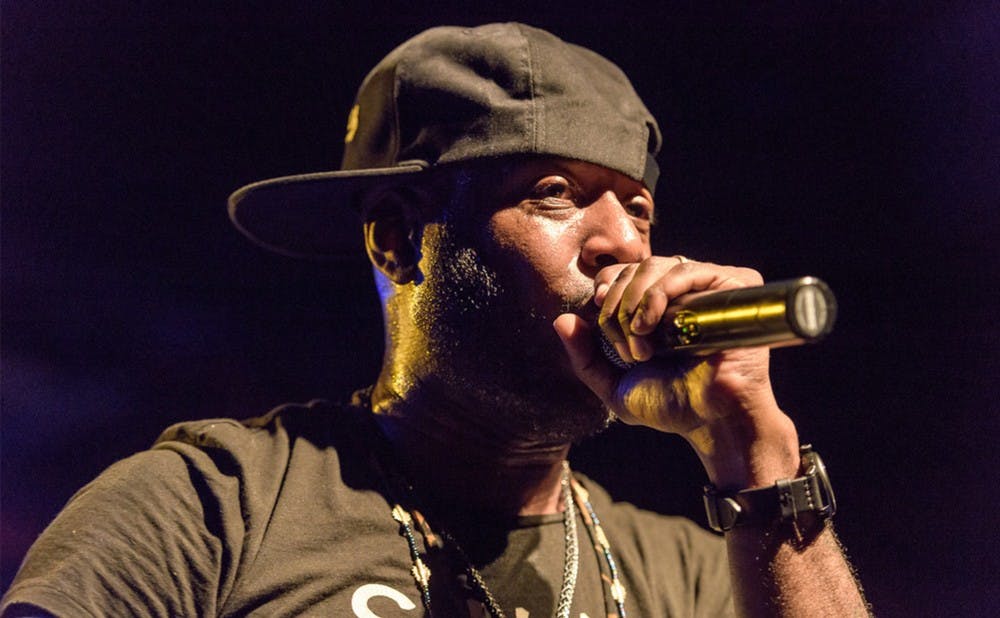In the latest addition to Duke Performances’ artist-in-residence series, hip-hop artist and activist Talib Kweli spent the last week in Durham holding conversations with Duke professors and Durham community members before playing two sold-out shows at Motorco Music Hall.
The residency began Wednesday with a public conversation between Kweli and resident professor Patrick Douthit, better known as the producer 9th Wonder, which was sponsored by Duke’s Forum for Scholars and Publics. The two discussed the role of hip-hop both as an art and as a form of social justice, chronicling Kweli’s career from his childhood in Brooklyn’s Park Slope neighborhood.
The child of two educators, Kweli (born Talib Kweli Greene) became involved in New York’s rap scene at a young age; he mused that hip-hop raised him just as much as his parents did. He attended New York University briefly before dropping out to pursue music (his parents were, for obvious reasons, not pleased to find this out—and nearly seven months after the fact). Eventually, he partnered with Yasiin Bey, more popularly known as Mos Def, to form the duo Black Star, producing the album for which he is best known, 1998’s “Mos Def and Talib Kweli Are Black Star.”
These days, Kweli is still putting out music, including a 2015 collaboration with 9th Wonder titled “Indie 500,” and last year’s surprise release, “Awful People Are Great at Parties.” But as he explained in both of his public discussions last week, Kweli’s role as an activist for social justice has expanded.
“Associating yourself with hip-hop means associating yourself with social justice,” Kweli said Wednesday. “The most beautiful thing about hip-hop is that it’s a skill-based medium...but we cannot mistake the fact that it started with black and brown people, out of oppression, out of struggle.”
Friday, Kweli spoke with Mark Anthony Neal, professor of African and African-American Studies, at Beyù Caffè in Durham. The conversation, titled “Beautiful Struggle: Hip Hop’s Role in the Trump Era,” was Beyù’s second partnership with Duke Performances as part of its “Be Connected” conversation series. Neal and Kweli considered the implications of the current political climate for artists and activists.
At both Wednesday’s and Friday’s talks, Duke Performances executive director Aaron Greenwald introduced the speakers with a plug for the National Endowment for the Arts, which helps fund efforts like Duke’s artist-in-residence program. Today, the program is on the hot seat: Donald Trump announced a budget Friday that would cut funding from the NEA. (“I hope you’ll keep an eye out as darkness encroaches,” Greenwald warned dryly.)
As an artist himself, Kweli acknowledged his duty to speak out. He called all other artists—and anyone who can control their own schedule—to do likewise.
“The artists are the documentarians,” Kweli said. “It’s our job to document, it’s our job to resist.”
He criticized the current administration for attempting to “silence” artists as well as journalists who he said failed to stand up to Trump in instances like Thursday’s well-publicized press conference, in which a question from an Orthodox Jewish reporter was shut down by the president. He also confessed to the naiveté that often comes with being part of the progressive “bubble” that encompasses academics and artists.
Amid this turbulent political landscape, Kweli has fostered an active Twitter presence, which he sees as an outlet for his activism. He has become known for engaging with the racist trolls who populate the social media platform, a task he sees as trivial compared to the real-life adversity he has faced as an outspoken black artist: “I do it with one thumb walking through RDU,” he joked.
The Durham residency closed with two nights of shows at Motorco Music Hall Thursday and Friday. Kweli is no chart-topper; he is known more for his lyricism and “conscious” image than for commercial success. But that has been enough to establish the rapper as a legend in the hip-hop world, and it didn’t stop audiences from turning out in droves to see him perform last week—both nights at Motorco sold out well in advance.
“Because I choose to speak out,” Kweli said, success has followed. “When you choose to engage, when you choose to speak out, people come to you.”
Get The Chronicle straight to your inbox
Signup for our weekly newsletter. Cancel at any time.

